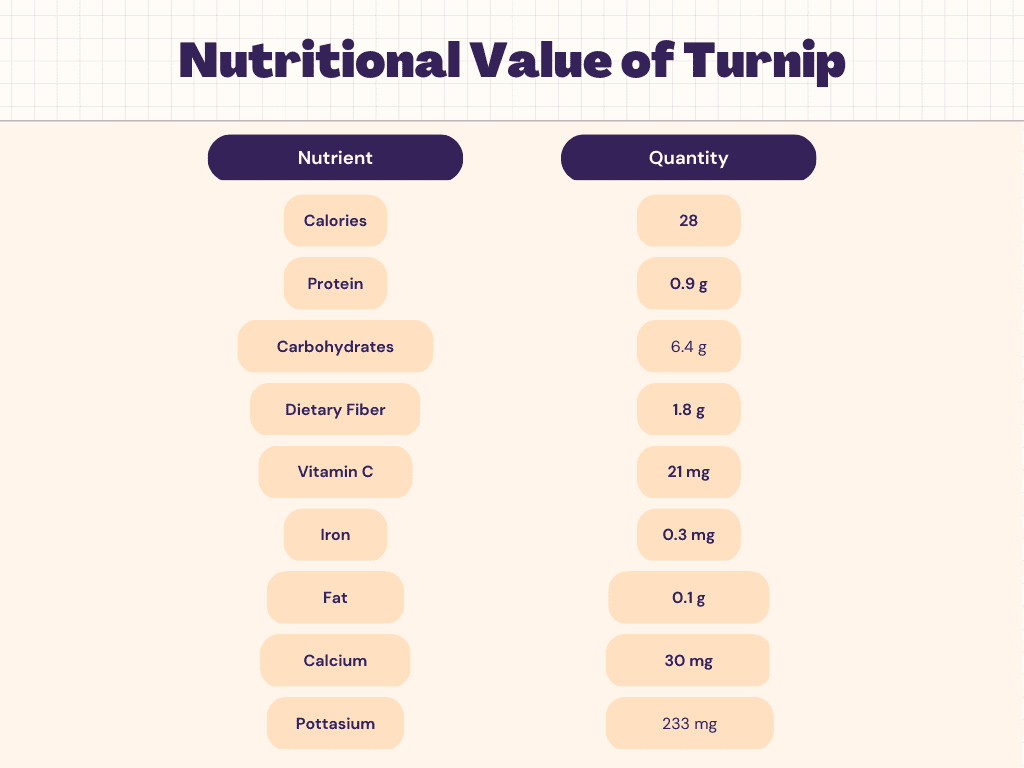Turnips are root vegetable that is commonly consumed in a variety of dishes, from soups and stews to salads and sides. They are known for their unique flavor and nutritional content, which can contribute to a healthy diet. In this article, we will explore the nutritional profile of turnips, including their calorie, protein, and carbohydrate content. By understanding the nutritional value of turnips, you can make informed choices about how to incorporate this versatile vegetable into your meals.
Nutritional Facts of Turnip
Carbs In Turnip
Turnips are a good source of carbohydrates, which provide energy for the body. A 100-gram serving of turnips contains approximately 6.4 grams of carbohydrates, with a relatively low glycemic index (GI) of 62. This means that the carbohydrates in turnips are broken down and absorbed by the body more slowly, leading to a more gradual rise in blood sugar levels compared to high-GI foods. Turnips also contain fiber, which is a type of carbohydrate that the body cannot digest. Fiber helps to slow down the digestion and absorption of carbohydrates, which can help to regulate blood sugar levels and promote feelings of fullness. Overall, turnips can be a nutritious addition to a healthy diet, providing a source of complex carbohydrates and fiber.
Protein In Turnip
While turnips are not a significant source of protein, they do contain a small amount of this essential nutrient. A 100-gram serving of turnips contains approximately 0.9 grams of protein. While this may not seem like much, turnips can still contribute to your daily protein intake as part of a varied diet. Protein is important for a variety of functions in the body, including building and repairing tissues, producing enzymes and hormones, and supporting a healthy immune system. While animal products are generally the richest sources of protein, plant-based sources like turnips can still provide valuable nutrition and are often lower in fat and calories.
Health Benefits Of Turnip
Turnips are a nutritious vegetable that may offer several health benefits, including those related to PCOS, diabetes, thyroid, and weight loss:
- PCOS: Turnips are a good source of fiber, which can help to regulate blood sugar levels and reduce insulin resistance – two key factors in PCOS. Additionally, turnips contain antioxidants and anti-inflammatory compounds that may help to improve hormonal balance and reduce inflammation. Check our PCOS Plans here.
- Diabetes: Like other non-starchy vegetables, turnips are a low-glycemic-index food that can help to regulate blood sugar levels. Turnips are also high in fiber, which can slow down the digestion and absorption of carbohydrates, leading to a more gradual rise in blood sugar levels. Additionally, turnips are a good source of potassium, a mineral that may help to improve insulin sensitivity and reduce the risk of type 2 diabetes. Check our Diabetes Plans here.
- Thyroid: Turnips are cruciferous vegetables, which means they are rich in nutrients that may help to support healthy thyroid function. For example, turnips contain goitrogens, compounds that can help to regulate thyroid hormones and prevent thyroid disorders. Turnips are also a good source of iodine, a mineral that is essential for thyroid function. Check our Thyroid Plans here.
- Weight loss: Turnips are low in calories and high in fiber, which can help to promote feelings of fullness and reduce overall calorie intake. Additionally, turnips are a good source of nutrients like vitamin C, which may help to support a healthy metabolism and aid in weight loss. By incorporating turnips into a balanced diet, individuals may be able to support their weight loss goals while still obtaining essential nutrients. Check our Weight Loss Plans here.
Vitamins & Minerals in Turnip
Turnips are nutritious vegetables that are rich in several vitamins and minerals. Here are some of the key vitamins and minerals found in turnips:
- Vitamin C: Turnips are an excellent source of vitamin C, with a 100-gram serving providing about 21 mg of this important antioxidant. Vitamin C is essential for immune function, skin health, and wound healing.
- Folate: Turnips are a good source of folate, a B vitamin that is important for cell growth and development. A 100-gram serving of turnips contains approximately 21 mcg of folate.
- Potassium: Turnips are a good source of potassium, a mineral that is important for heart health and blood pressure regulation. A 100-gram serving of turnips provides about 233 mg of potassium.
- Calcium: While not as rich in calcium as some other vegetables, turnips still provide a modest amount of this important mineral. A 100-gram serving of turnips contains approximately 30 mg of calcium.
- Iron: Turnips contain a small amount of iron, with a 100-gram serving providing about 0.3 mg of this essential mineral. Iron is important for oxygen transport in the body and can help to prevent anemia.
- Other nutrients: Turnips also contain smaller amounts of other important nutrients, including vitamin K, vitamin E, magnesium, and phosphorus.
The Bottom Line
Turnips are nutritious vegetables that contain several vitamins and minerals that are important for overall health. They are a good source of vitamin C, folate, potassium, calcium, and iron, and also contain smaller amounts of other nutrients such as vitamin K, vitamin E, magnesium, and phosphorus. Turnips may provide health benefits related to PCOS, diabetes, thyroid, and weight loss, as they are a low-glycemic-index food that can help to regulate blood sugar levels, and they are rich in fiber, antioxidants, and anti-inflammatory compounds that may help to improve hormonal balance and reduce inflammation. Additionally, turnips are cruciferous vegetables that may support healthy thyroid function.
Faqs
How many turnips can I eat in a day?
The amount of turnips you can eat in a day depends on a variety of factors, such as your overall diet, individual nutrient needs, and any health conditions you may have. However, in general, turnips are a low-calorie and nutrient-dense vegetable, so you can enjoy them as part of a healthy, balanced diet.
The American Heart Association recommends consuming at least 4-5 servings of vegetables per day, and a serving size is typically around 1/2 to 1 cup of cooked vegetables. For turnips, this would be roughly equivalent to one medium-sized turnip or a few smaller turnips.
It’s always a good idea to speak with a healthcare professional or a registered dietitian if you have any concerns about how many turnips or other foods you should be consuming as part of your diet. They can provide personalized advice and help you create a healthy eating plan that meets your specific needs.
Should I eat Turnip before or after exercise?
The timing of when to eat turnips in relation to exercise depends on several factors, such as the timing and intensity of the exercise, the rest of your diet, and your individual goals.
In general, turnips are a low-calorie and nutrient-dense vegetable that can provide carbohydrates, fiber, and various vitamins and minerals that can support exercise performance and recovery. However, turnips are also a source of fiber, which can slow down digestion and may cause some digestive discomfort if eaten immediately before exercise.
As a general guideline, it’s recommended to eat a small snack or meal containing a mix of carbohydrates and protein about 1-2 hours before exercising to provide fuel and nutrients for your body. This could include a small serving of turnips along with other foods such as whole grains, lean protein, and healthy fats.
It’s also important to drink enough water before, during, and after exercise to stay hydrated and support optimal performance.
If you have specific questions or concerns about what and when to eat in relation to your exercise routine, it’s always a good idea to consult with a registered dietitian or healthcare professional for personalized advice.
What are the benefits of Turnip?
Turnips are nutritious vegetables that provide a range of health benefits. Some potential benefits of consuming turnips include:
- Rich in nutrients: Turnips are a good source of several important vitamins and minerals, including vitamin C, folate, potassium, calcium, and iron, among others.
- Low in calories: Turnips are low-calorie vegetables that are also low in fat and carbohydrates, making them a great choice for people looking to manage their weight.
- High in fiber: Turnips are a good source of dietary fiber, which can help to regulate digestion, promote feelings of fullness, and support healthy cholesterol levels.
- May help regulate blood sugar levels: Turnips have a low glycemic index, meaning they can help to regulate blood sugar levels and reduce the risk of insulin resistance.
- May support healthy thyroid function: Turnips are a cruciferous vegetable, which means they contain compounds that may help to support healthy thyroid function.
- May have anti-inflammatory properties: Turnips contain antioxidants and other compounds that may help to reduce inflammation in the body, which can reduce the risk of chronic diseases such as heart disease and cancer.
Overall, turnips are a nutrient-dense vegetable that can be a healthy addition to a balanced diet and may provide a range of health benefits when consumed regularly.
What is the best time to eat Turnip?
There isn’t necessarily a “best” time of day to eat turnips, as it ultimately depends on your individual needs and preferences. Turnips are versatile and nutrient-dense vegetables that can be incorporated into meals and snacks throughout the day.
That being said, turnips are a source of fiber, which can help to regulate digestion and promote feelings of fullness. Eating fiber-rich foods like turnips earlier in the day may help to keep you feeling full and satisfied, which can help to reduce the likelihood of overeating later on.
Some ideas for incorporating turnips into your diet throughout the day could include adding them to a breakfast hash or frittata, roasting them as a side dish for lunch or dinner, or incorporating them into a soup or stew for a warming and nourishing meal.
Ultimately, the most important thing is to eat turnips as part of a balanced and varied diet that meets your individual nutritional needs and preferences.










